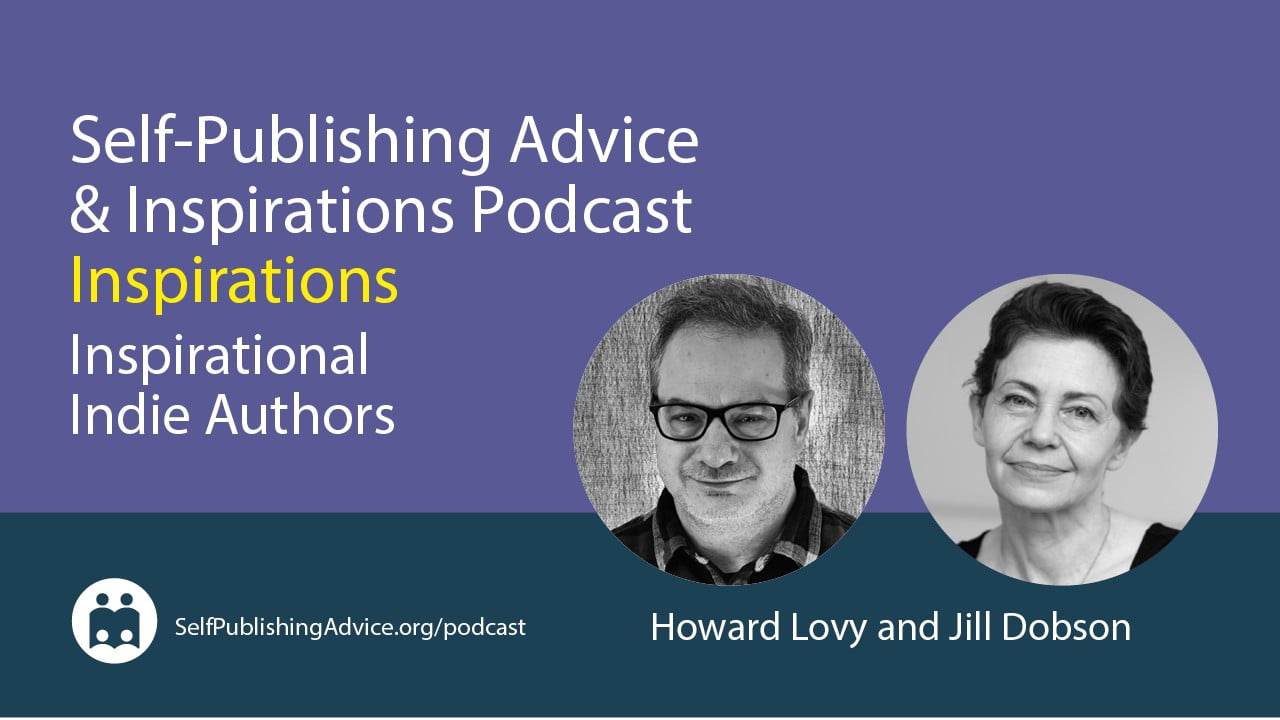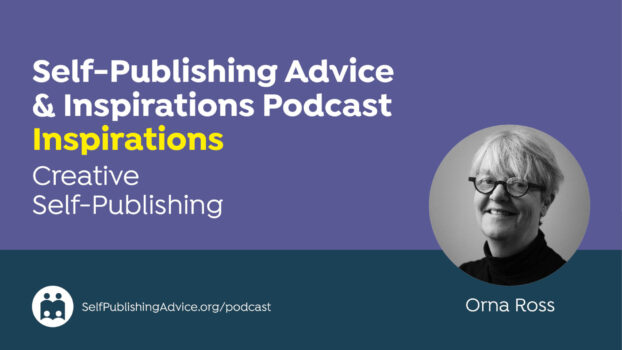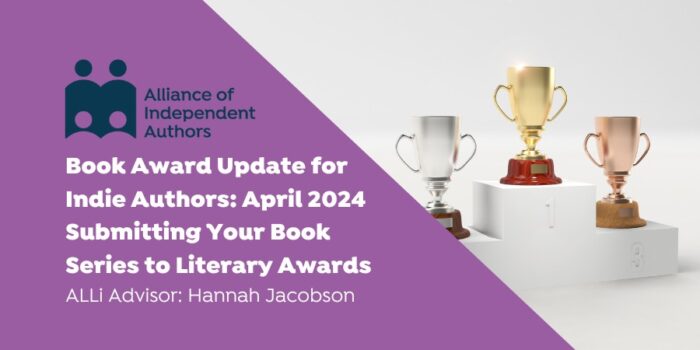My ALLi author guest this episode is Jill Dobson, whose story is a little different from the ones I usually tell on this podcast. She found a traditional publisher at a very young age—in fact, when she was a teenager. Then she endured decades of rejection or, even worse, being ignored. She recently went indie and felt like a weight was lifted. Now, it's up to readers to decide and not a nameless gatekeeper.
Find more author advice, tips, and tools at our Self-publishing Author Advice Center, with a huge archive of 2,000+ blog posts, and a handy search box to find key info on the topic you need.
We invite you to join our organization and become a self-publishing ally.
Listen to the Inspirational Indie Author Interview: Jill Dobson
On the Inspirational Indie Authors podcast, @howard_lovy features @DrJillDobson, an author who got tired of the waiting game and went indie. Click To TweetDon't Miss an #AskALLi Broadcast
Subscribe to our Ask ALLi podcast on iTunes, Stitcher, Player.FM, Overcast, Pocket Casts, Spotify or via our RSS feed:
Inspirational Indie Author Interview: Jill Dobson. About the Author
Jill Dobson grew up in Australia and now lives in Scotland. Her first book, a dystopian YA novel, The Inheritors, was published in 1988, when she was a student at the University of Melbourne. After two more novels, Jill was dropped by her publisher. She kept writing and had several agents, but nothing she wrote fit the market niche publishers were aiming to fill. She finally went indie in January 2024, with a rewrite of The Inheritors. A sequel is in the works. You can find Jill on her website, Facebook, and Substack.
About the Host
Howard Lovy has been a journalist for more than 35 years, and now amplifies the voices of independent author-publishers and works with authors as a developmental editor. Find Howard at howardlovy.com, LinkedIn and X.
If you’re a published indie author who would like to be interviewed by Howard for the Inspirational Indie Authors podcast, you need to be a member of the Alliance of Independent Authors.
Then contact Howard, including your membership number, explaining why you’re an inspirational indie author and what inspires you.
If you haven’t already, we invite you to join our organization.
Read the Transcripts to the Inspirational Indie Author Interview: Jill Dobson
Howard Lovy: My guest this episode is Jill Dobson, whose story is a little different from the ones I usually tell on this podcast.
She found a traditional publisher at a very young age, in fact when she was a teenager. Then she endured decades of rejection, or even worse, being ignored. She recently went indie and felt like a weight was lifted. Now, it's up to readers to decide and not a nameless gatekeeper. I'll let Jill Dobson tell her story.
Jill Dobson: Hello, I'm Jill Dobson. I'm a British/Australian writer currently based in Glasgow. At the very beginning of this year, I pressed publish on my first indie book. It was my debut novel in more ways than one. I originally published it in 1988. It was published as a young adult novel by the University of Queensland Press in Australia, and I was a teenager myself, and it was my first published book.
Then, as we'll go into more detail, I published a few more books with them and then I spent 20 years not getting published and becoming very frustrated, and all the time keeping one eye on the development of indie publishing, and finally last year I decided that I would go indie myself and that I would start with my very first published book because it was already there, it had been published, it had a life, it had been out in the world, and it was a way of experimenting and learning the ropes, learning how to format, learning about marketing, setting up a website. Doing all that and just seeing how it went for me as preparation to publishing my extensive unpublished backlist.
In the process of rewriting something that I had written as a 16/17-year-old, I fell down a hole and now I have four more books planned, and I've just started writing book two.
Howard Lovy: Jill has been reading and writing from a very young age.
Jill Dobson: My family moved from Britain when I was very young, and I grew up in a little country town, about 40,000 people, on the border of Victoria and New South Wales.
So, I was one of those weird, bookish, nerdy kids, and I started writing my first novel when I was about six or seven, and I illustrated it as well, which I stopped doing a long time ago. But I was always a writer, and I wrote diaries, and I wrote little magazines, and the usual thing that odd bookish kids do.
I finally, I was about 16, I finished a novel and, I can't remember, I always assumed that at some point I would want it to be published, and a family friend had a writer's group newsletter and there was a small ad saying that the University of Queensland press was just starting up a young adult list, and they were soliciting submissions.
In the Australian system, a lot of writers don't have agents, so it never occurred to me to look for an agent. You just submit it directly to publishers. So, as a 16-year-old, I packed up my typewritten manuscript and posted it away, and yeah, it was, accepted.
Howard Lovy: What she wrote was a YA speculative fiction thriller that reflected the fears prevalent in the 1980s.
Jill Dobson: I was writing the mid-eighties, and this is before climate change became the thing. Back in the day, we were worried about nuclear extinction.
As part of my research, I still have this little booklet issued by the Australian government, on what to do in the case of nuclear war, even though we were quite a long way away from where this would happen. So, this was something that you grew up with.
So, my book, it's speculative fiction. It was set in the near future, and this community of survivors are living under this dome that was originally designed as a moon base, and the prototype was set up somewhere in central Australia, but then nuclear war happened, and there's this community of survivors there, and it's about 30 years later, and this group of teenagers with a protagonist who begins to question this extremely pragmatic sort of totalitarian survivor society in which they're all living.
It was published as YA, and I didn't write it as YA. I just happened to be 16 when I wrote it, so I was writing about 16-year-olds, but the idea was that as I grew up, I would write grown up books. That was the natural progression.
Howard Lovy: Meanwhile, Jill figured she needed a job to support her writing habit.
Jill Dobson: Things are a bit different in Australia. There was no possibility, very few people make a living as novelists in Australia. Back in the day, there was Colleen McCullough. You remember the Thorn Birds? She was like the big internationally best-selling author, but otherwise you just had to get a job, and there wasn't the whole culture of creative writing degrees. That's very much taken on in Australia in the 2000s, but back in the 80s people didn't study creative writing. The nearest thing you'd study would be English lit, but that wouldn't necessarily have any sort of creative component.
I knew that, if I wanted to write, I needed to get a job, and I wanted an interesting job where I could travel and have experiences, and write about them. So, I decided that I wanted to be a diplomat. So, I studied politics and Japanese and history, and the idea was I would be this novel writing diplomat.
At the same time, while I was at university, I wrote my second novel, which was also YA, and I didn't have any sort of contract with UQP. My editor just said to me, send in the next one when it's ready, and that was it.
I wasn't suddenly plunged into this new life as a writer. I was just another 18-year-old going off to university because I needed a job.
Howard Lovy: As Jill pursued her education, she was constantly writing on the side.
Jill Dobson: I had a disinclination to get a day job. I managed to stretch out my undergraduate degree, my university education to about 10 years. So, I went off to Japan and did some teaching, and came back and then started another degree, and then went to Japan again, and all the time I was writing.
Then I came back and did a master's degree in international relations, and then I ended up working in Canberra as a public servant for the Australian government and still writing away.
I think at this point, I really didn't want to be a young adult author, and I was wanting a bit more from my publisher. I'd tried sending a few things to agents and not really getting anywhere. So, then I returned to writing a young adult fantasy book that I'd actually started writing when I was quite a bit younger and thought, well, I'll go back and write this rather than getting bogged down in trying to write some literary fiction.
Howard Lovy: Her publisher recommended she write a sequel to her previous work.
Jill Dobson: Like a good author, I said, oh yes, okay, I'll do that, and I went away, and I spent about two years writing a sequel. I had no contract. I just went away and wrote it as I'd always done and sent it in, and then I was stonewalled for about a year.
She finally sent me a reader's report and the reader didn't really like it, but I did the edits anyway, and then about a week or two after, very shortly after I'd sent in the edits, I got this email saying, oh, look, sorry, we've decided, we're not going to publish this, young adult fantasy novels, they're not really profitable. This was in like the early 2000's.
At this point, I had an agent in London, and she'd tried to sell it and couldn't sell it, and then she stopped answering my emails, and I kept on writing. I was following the advice that, while you're submitting one thing, you just get back to your desk the next day and you write the next thing. You just keep on going. You keep on going, because one day it'll work out for you. You just have to do the work.
Howard Lovy: After that, Jill spent some time in the wilderness. She continued writing, if only for herself. Why? Because writing is what she does.
Jill Dobson: Writing is my one thing.
It's my vocation. Even if I couldn't make a living from it, it's the one thing that I do, and it never occurred to me to not do it.
I suppose I still have this notion of this literary career. You're invited to festivals and interviewed by serious magazines, and one day this would happen to me too, and I had a lot of my identity staked on this.
I've often thought, maybe if I had some really exciting and interesting and fulfilling career, maybe that would have lured me away from writing, but that didn't happen. Writing was still the most satisfying thing that I was doing, and there was no day job that gave me anything like that sort of sense of satisfaction and so I kept plugging on.
The definition of stupidity is doing the same thing, even though it doesn't work out for you.
Howard Lovy: It took years and more ghosting by agents and a rollercoaster of ups and downs as she sought a publisher before Jill finally had enough and decided to go indie.
Jill Dobson: I had a few literary grants, and I took time off to do a PhD and then came back.
I think the final motivation, I mean, I'd spent ages researching, writing this historical novel, which I thought, okay, this is something that can be marketable, and I won, in 2021, I actually won a first chapter competition here in the UK, and I thought, oh, the door is finally, it's opened, the door is open.
So, I spent about a year editing and editing and rewriting this novel under the guidance of the literary consultancy that, that ran this award, and in the end, they said to me it was a matter of market niche, like this doesn't fit into a marketing niche.
People have always said, you write very well, so I knew that wasn't the problem. It was just, oh, this is not a spy thriller, but it's not a family saga, what is it? Does it have to fit under this very particular sort of niche. I would say that it's literary fiction, which of course is a genre, but it's the one genre in which you have the freedom not to fit into really specific templates.
So, after a year, they said, we can't help you anymore, and that's the point I thought, okay, I've had enough. I've had enough.
Howard Lovy: What Jill had enough of was waiting for a publisher or agent to decide whether her books were worth releasing to the public.
Something clicked inside Jill, and she decided she had no more time to waste waiting.
Jill Dobson: I suppose, getting into my fifties and thinking, I'm never going to be this young, debut author and how much time do I have left?
If I put aside this whole idea of the literary career, which very few people have, and just refocus in on what does success mean to me? I would like to actually, if I put my books out there myself, people will have a chance to read them. I want people to read my books. I don't want to write for the draw, because writing is only complete when people have read you. That sort of completes the circle. I thought I could put my books out there and maybe three people read them, but from experience, sending things to agents, nobody reads your stuff.
I'd gone from at least getting, nice, personalized rejection notes to just absolutely nothing. So, it's like sending your stuff out into a void and thought, at least if I publish my own work, then, someone can stumble upon it and read it rather than just, burying it in the slush pile.
Also, there was possibly an element of just getting older. As you get older, agents and publishers just get younger, have you noticed this?
You think, these people who are like, just, rejecting your work, they weren't even born when I published my first book, and I'm thinking, do they know more about writing than me? Really?
And you think, am I giving these people the power to arbitrate, to make decisions. Why should I? I thought, the worst that happens, I put my book out there, books out there, and nobody reads them, but at least they've had the chance.
So, that was like, okay, I'll do it. Yeah, that was what I basically spent all last year doing.
What's the most important thing to me? I want people to read me, and the technology exists for me to do that myself, and publishing is changing so much.
I've been published since 1988. So, I work in publishing and just seeing how it's changing, and I don't think trad publishing is really keeping up with these changes and possibilities, and also, I think within the industry, there is this, I think it's a complacency and snobbery, just in the way that writers are treated. I think writers are treated very poorly.
Howard Lovy: Jill says that since she decided to go indie, it's like a weight has lifted.
She's no longer waiting for approval by gatekeepers. But she warns, going indie does not mean sacrificing the quality of your writing.
Jill Dobson: Being able to make that judgment about your work, I think you need that takes some experience. I've been working at this sort of. a long time. I've read a lot of books and I've written a lot of novels and I think I do have a feel for what works and what doesn't.
So yeah, just work really hard on the writing, because at the end of the day, that is what will get you readers, not marketing and all the bells and whistles. It's the quality of what you are writing.





